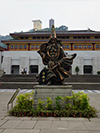|
Fengdu (丰都)
Name of a place that represents You Dou (幽都), literally ‘Entirely Dark’ or ‘Entirely Quiet’,
or ‒if pronounced You Du, ‘Dark Capital’, the capital of
Diyu, the Underworld or Hell, i.e. the realm of the dead. It is located on Ming Mountain
(fig.) on the north bank of the Yangtze River (fig.) in
China. On its pinnacle is a pagoda as well as a large head of the
Jade Emperor, i.e. the
Taoist ruler of heaven and earth. It is said that the head is accessible and was initially meant to become a hotel to visitors. A distance away from it is the Skyscraping Palace, also known as the Jade Emperor Hall, which houses as statue of
Yu Huang (fig.), seated on his heavenly throne, as well as some other deities. Adjacent is the Wuchang Hall, which houses
Bai Wu Chang (fig.), of whom a statue stands at the entrance of Fengdu Ghost City. He is a Chinese Hell Guard, whose name translates as ‘White Impermanence’ or ‘Pure Impermanence’. He is a servant of the Underworld, who guides the souls of the kind and benevolent dead, to safely pass the
Bridge of Troubled Water (fig.). The bridge, which is also known as the Bridge of Helplessness and the Bridge of No Return, is guarded by demons, who either allow or forbid passage. It was built during the Ming Dynasty to allow visitors to test themselves for being Good or Evil by crossing the middle arch of this bridge. Pilgrims to the city can here assess themselves how they do on the three tests that the dead must pass before being allowed passage to the next life. The souls of the kind and benevolent dead are allowed to pass and are guided across by Bai Wu Chang, whereas the souls of the evil and wicked people will be pushed into the water below, known as the Lake of the Doomed
and the
Gate of Hell (fig.). The Home-seeing Terrace is the a tower from which the dead are allowed to take a last look at their hometowns and say goodbye to their beloved ones before entering the afterlife. Fengdu Ghost City is like a theme park filled with life-sized statues of deities and demons that play a role in life and in the afterlife, as well as with models that represent places from Chinese-Taoist mythology related to heaven and hell. In full it is known as Fengdu Gui Cheng (丰都鬼城), i.e.
‘Fengdu
Ghost City’.
回






|

